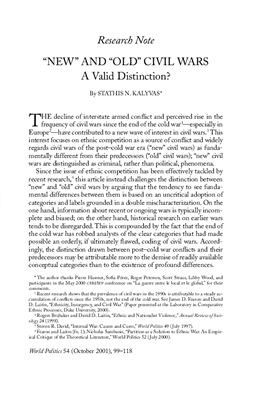THE decline of interstate armed conflict and perceived rise in
the
frequency of civil wars since the end of the cold war1—especially in
Europe2—have contributed to a new wave of interest in civil wars.3 This
interest focuses on ethnic competition as a source of conflict and widely
regards civil wars of the post–cold war era (new civil wars) as fundamentally
different from their predecessors (old civil wars); new civil
wars are distinguished as criminal, rather than political, phenomena.
frequency of civil wars since the end of the cold war1—especially in
Europe2—have contributed to a new wave of interest in civil wars.3 This
interest focuses on ethnic competition as a source of conflict and widely
regards civil wars of the post–cold war era (new civil wars) as fundamentally
different from their predecessors (old civil wars); new civil
wars are distinguished as criminal, rather than political, phenomena.

